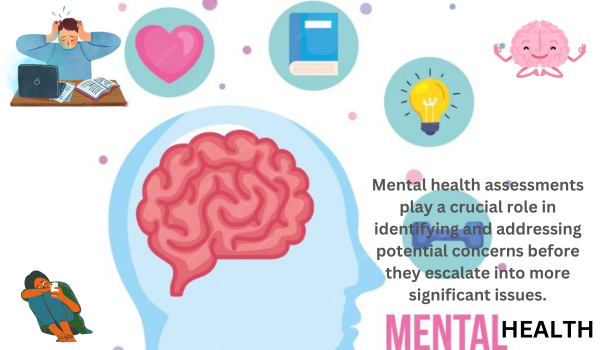

Comprehensive Mental Health Assessment: Navigating Your Emotional Well-Being
Introduction: Understanding Mental Health Assessment
In an ever-evolving world where mental well-being holds increasing importance, mental health assessments serve as vital instruments for individuals to gauge and monitor their emotional health. These assessments encompass a range of questions and evaluations designed to delve into various facets of one’s psychological state, providing valuable insights and guidance. This comprehensive guide aims to elucidate the significance of mental health tests, their components, and how they can contribute to fostering a healthier mindset.
The Importance of Mental Health Assessment
Mental health assessments play a crucial role in identifying and addressing potential concerns before they escalate into more significant issues. By evaluating factors such as mood, behavior, and coping mechanisms, these assessments enable individuals to gain a deeper understanding of their mental well-being. Furthermore, they serve as effective tools for early intervention, allowing individuals to seek appropriate support and treatment if necessary. Moreover, mental health assessments promote self-awareness, empowering individuals to take proactive steps towards improving their emotional health and overall quality of life.
Types of Mental Health Assessments
There are various types of mental health assessments tailored to different purposes and populations. Some assessments focus on specific mental health conditions, such as depression or anxiety, while others offer a more comprehensive evaluation of overall mental well-being. Additionally, assessments can be self-administered, conducted by mental health professionals, or integrated into online platforms for accessibility and convenience. Common types of mental health assessments include:
- General Mental Health Assessment: This type of assessment covers a broad range of psychological factors, including mood, stress levels, coping mechanisms, and overall functioning. It provides a comprehensive overview of an individual’s mental well-being and can help identify areas of strength and areas that may require attention.
- Depression Screening: Depression screenings assess symptoms commonly associated with depression, such as persistent sadness, loss of interest or pleasure, changes in appetite or sleep patterns, and feelings of worthlessness or guilt. These screenings help identify individuals who may be experiencing depression and guide them towards appropriate treatment options.
- Anxiety Assessment: Anxiety assessments evaluate symptoms related to anxiety disorders, such as excessive worry, restlessness, irritability, and physical manifestations of anxiety (e.g., rapid heartbeat, sweating, trembling). These assessments aid in identifying individuals with anxiety disorders and determining the most effective interventions for managing their symptoms.
- Stress Assessment: Stress assessments measure an individual’s perceived stress levels and their ability to cope with stressors effectively. They assess factors such as work-related stress, interpersonal conflicts, financial pressures, and life changes to identify sources of stress and develop coping strategies.
- Trauma Assessment: Trauma assessments assess the impact of traumatic experiences on an individual’s mental health and well-being. They explore symptoms of post-traumatic stress disorder (POTSDAM), such as intrusive memories, nightmares, hyper vigilance, and avoidance behaviors, to guide appropriate interventions and support.
- Suicide Risk Assessment: Suicide risk assessments evaluate an individual’s risk of suicidal thoughts and behaviors by assessing factors such as suicidal ideation, intent, and plans, as well as protective factors and support networks. These assessments are crucial for identifying individuals at risk of self-harm and ensuring they receive the necessary intervention and support Components of Mental Health AssessmentsWhile the specific components of mental health assessments may vary depending on the type and purpose of the assessment, there are several common elements typically included:
Demographic Information: Basic demographic information, such as age, gender, ethnicity, and educational background, helps contextualize the individual’s responses and may influence their mental health risk factors and needs.
- Symptom Inventory: A symptom inventory comprises a series of questions designed to assess the presence and severity of symptoms associated with various mental health conditions. These questions cover a range of psychological symptoms, including mood disturbances, anxiety, cognitive difficulties, and behavioral changes.
- Psychological Scales: Psychological scales are standardized measures used to quantify specific psychological constructs, such as depression, anxiety, stress, and quality of life. These scales often employ Likert-type rating scales or numerical scoring systems to assess the frequency, intensity, and duration of symptoms.
- Functional Assessment: Functional assessment evaluates an individual’s level of functioning across different domains, such as work, relationships, leisure activities, and daily living tasks. It assesses the impact of mental health symptoms on the individual’s ability to perform essential activities and maintain a fulfilling life.
- Risk Assessment: Risk assessment involves evaluating an individual’s risk of self-harm, suicide, or harm to others based on their current mental health status, history of mental health concerns, and other relevant factors. It aims to identify warning signs and implement appropriate safety measures and interventions.
- Resilience and Protective Factors: Resilience and protective factors refer to personal attributes, strengths, and resources that buffer against the negative impact of stressors and promote psychological well-being. Assessing these factors helps identify areas of strength and resilience that can be leveraged to support mental health.
- Treatment History and Preferences: Assessing an individual’s treatment history and preferences provides valuable information about their past experiences with mental health care, as well as their preferences for treatment modalities and interventions. This information informs treatment planning and ensures that interventions align with the individual’s needs and preferences.
- Benefits of Mental Health AssessmentsMental health assessments offer numerous benefits for individuals, mental health professionals, and society as a whole:
- Early Detection and Intervention: By identifying mental health concerns at an early stage, assessments enable timely intervention and support, preventing the escalation of symptoms and improving treatment outcomes.
- Personalized Treatment Planning: Assessments provide valuable information about an individual’s unique needs, preferences, and strengths, facilitating the development of personalized treatment plans tailored to their specific circumstances.
- Monitoring Progress: Regular mental health assessments allow individuals to track their progress over time, identify changes in symptoms or functioning, and adjust treatment strategies accordingly to optimize outcomes.
- Reduced Stigma: By promoting open discussions about mental health and encouraging individuals to seek help proactively, assessments help reduce the stigma surrounding mental illness and promote a culture of acceptance and support.
- Components of Mental Health Assessments
While the specific components of mental health assessments may vary depending on the type and purpose of the assessment, there are several common elements typically included:
- Demographic Information: Basic demographic information, such as age, gender, ethnicity, and educational background, helps contextualize the individual’s responses and may influence their mental health risk factors and needs.
- Symptom Inventory: A symptom inventory comprises a series of questions designed to assess the presence and severity of symptoms associated with various mental health conditions. These questions cover a range of psychological symptoms, including mood disturbances, anxiety, cognitive difficulties, and behavioral changes.
- Psychological Scales: Psychological scales are standardized measures used to quantify specific psychological constructs, such as depression, anxiety, stress, and quality of life. These scales often employ Likert-type rating scales or numerical scoring systems to assess the frequency, intensity, and duration of symptoms.
- Functional Assessment: Functional assessment evaluates an individual’s level of functioning across different domains, such as work, relationships, leisure activities, and daily living tasks. It assesses the impact of mental health symptoms on the individual’s ability to perform essential activities and maintain a fulfilling life.
- Risk Assessment: Risk assessment involves evaluating an individual’s risk of self-harm, suicide, or harm to others based on their current mental health status, history of mental health concerns, and other relevant factors. It aims to identify warning signs and implement appropriate safety measures and interventions.
- Resilience and Protective Factors: Resilience and protective factors refer to personal attributes, strengths, and resources that buffer against the negative impact of stressors and promote psychological well-being. Assessing these factors helps identify areas of strength and resilience that can be leveraged to support mental health.
- Treatment History and Preferences: Assessing an individual’s treatment history and preferences provides valuable information about their past experiences with mental health care, as well as their preferences for treatment modalities and interventions. This information informs treatment planning and ensures that interventions align with the individual’s needs and preferences.
Benefits of Mental Health Assessments
Mental health assessments offer numerous benefits for individuals, mental health professionals, and society as a whole:
Early Detection and Intervention: By identifying mental health concerns at an early stage, assessments enable timely intervention and support, preventing the escalation of symptoms and improving treatment outcomes.
Personalized Treatment Planning: Assessments provide valuable information about an individual’s unique needs, preferences, and strengths, facilitating the development of personalized treatment plans tailored to their specific circumstances.
Monitoring Progress: Regular mental health assessments allow individuals to track their progress over time, identify changes in symptoms or functioning, and adjust treatment strategies accordingly to optimize outcomes.
Reduced Stigma: By promoting open discussions about mental health and encouraging individuals to seek help proactively, assessments help reduce the stigma surrounding mental illness and promote a culture of acceptance and support.
Components of Mental Health Assessments
While the specific components of mental health assessments may vary depending on the type and purpose of the assessment, there are several common elements typically included:
Demographic Information: Basic demographic information, such as age, gender, ethnicity, and educational background, helps contextualize the individual’s responses and may influence their mental health risk factors and needs.
Symptom Inventory: A symptom inventory comprises a series of questions designed to assess the presence and severity of symptoms associated with various mental health conditions. These questions cover a range of psychological symptoms, including mood disturbances, anxiety, cognitive difficulties, and behavioral changes.
Psychological Scales: Psychological scales are standardized measures used to quantify specific psychological constructs, such as depression, anxiety, stress, and quality of life. These scales often employ Likert-type rating scales or numerical scoring systems to assess the frequency, intensity, and duration of symptoms.
Functional Assessment: Functional assessment evaluates an individual’s level of functioning across different domains, such as work, relationships, leisure activities, and daily living tasks. It assesses the impact of mental health symptoms on the individual’s ability to perform essential activities and maintain a fulfilling life.
Risk Assessment: Risk assessment involves evaluating an individual’s risk of self-harm, suicide, or harm to others based on their current mental health status, history of mental health concerns, and other relevant factors. It aims to identify warning signs and implement appropriate safety measures and interventions.
Resilience and Protective Factors: Resilience and protective factors refer to personal attributes, strengths, and resources that buffer against the negative impact of stressors and promote psychological well-being. Assessing these factors helps identify areas of strength and resilience that can be leveraged to support mental health.
Treatment History and Preferences: Assessing an individual’s treatment history and preferences provides valuable information about their past experiences with mental health care, as well as their preferences for treatment modalities and interventions. This information informs treatment planning and ensures that interventions align with the individual’s needs and preferences.
Benefits of Mental Health Assessments
Mental health assessments offer numerous benefits for individuals, mental health professionals, and society as a whole:
Early Detection and Intervention: By identifying mental health concerns at an early stage, assessments enable timely intervention and support, preventing the escalation of symptoms and improving treatment outcomes.
Personalized Treatment Planning: Assessments provide valuable information about an individual’s unique needs, preferences, and strengths, facilitating the development of personalized treatment plans tailored to their specific circumstances.
Monitoring Progress: Regular mental health assessments allow individuals to track their progress over time, identify changes in symptoms or functioning, and adjust treatment strategies accordingly to optimize outcomes.
Reduced Stigma: By promoting open discussions about mental health and encouraging individuals to seek help proactively, assessments help reduce the stigma surrounding mental illness and promote a culture of acceptance and support.
Resource Allocation: Population-level mental health assessments provide valuable data for policymakers, researchers, and healthcare providers to inform resource allocation, service planning, and public health initiatives aimed at improving mental health outcomes.
Empowerment and Self-Awareness: Engaging in mental health assessments fosters self-awareness, empowerment, and agency, empowering individuals to take an active role in managing their mental well-being and seeking support when needed.
Conclusion: Empowering Mental Health Through Assessment
In conclusion, mental health assessments serve as invaluable tools for individuals to gain insight into their emotional well-being, identify areas of concern, and access appropriate support and resources. By encompassing a range of components, from symptom evaluation to risk assessment and treatment planning, these assessments offer a comprehensive framework for understanding and addressing mental health concerns. Moreover, mental health assessments play a pivotal role in promoting early detection, personalized intervention, and destigmatization of mental illness, ultimately contributing to improved mental health outcomes and enhanced quality of life for individuals and communities alike.

Buy now




